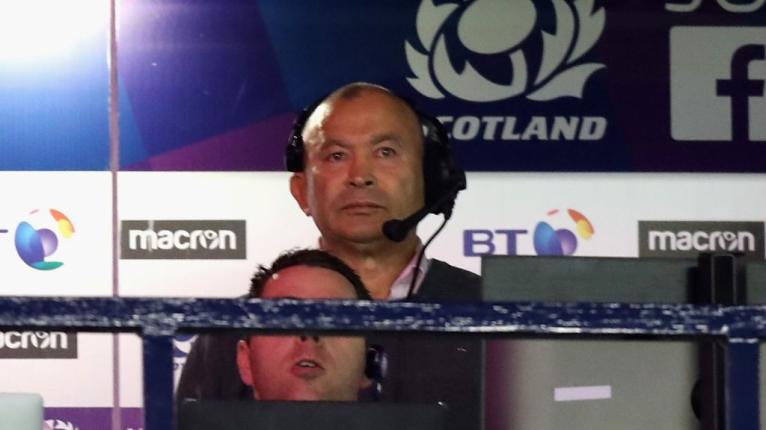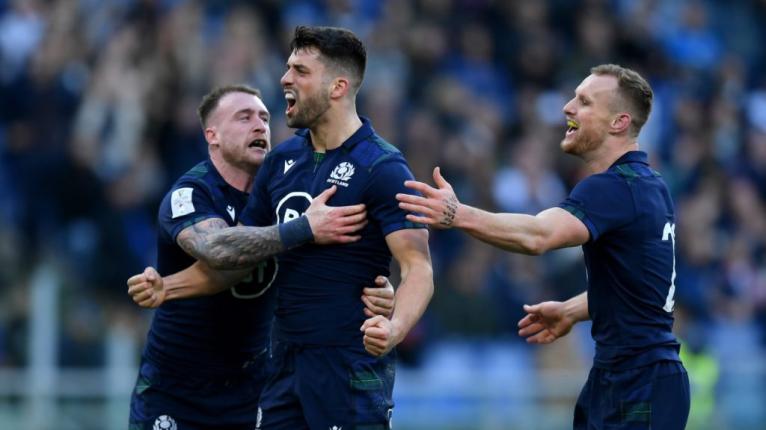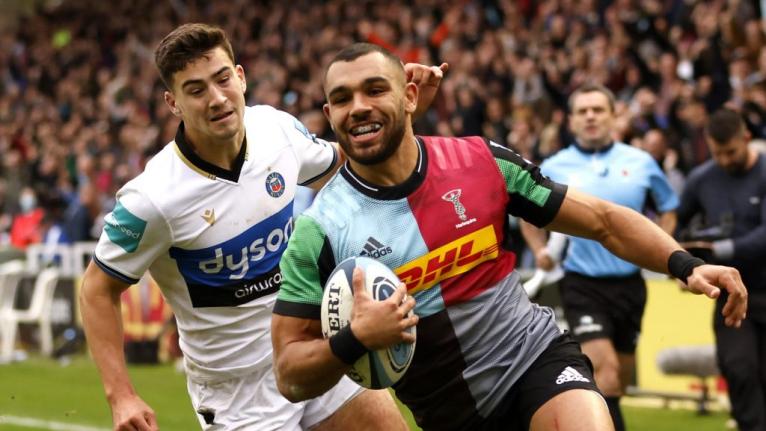Can you feel it yet? Can you hear it? You could set your watch by the sound of Scottish hopes rising to a crescendo this first week in February, and just as easily count the days until, like a breaking tsunami, they are dashed again a fortnight later.
For an age, Scottish rugby has existed in this perpetual state. A bleak Groundhog Day for which there is no cure. Occasional, blockbusting highs outnumbered by the familiarly wounding lows.
Eddie Jones love-bombs them in the press. Jim Telfer takes a call from a journalist and drops bombs of his own. The team shows promise and progress but never threatens to deliver the title. Theatre, anticipation and in the end, heartbreak.
Ah, but this year is supposed to be different. Scotland have unprecedented depth, you see. The best squad for years – no, scratch that, decades. France and England at home. A full Murrayfield behind them and big scalps already claimed in the past twelve months. This must be their year. Mustn’t it?
There was an amusing headline on an agency piece, carried by many outlets, including this one, last week. ‘Six Nations expectations soaring in Scotland despite scepticism from outside’, it proclaimed. Cue flashbacks to Eddie O’Sullivan’s tousy prickling about the ‘delusions’ of Scots who think they are better than the cold business of results, medals and trophies would indicate.
Eddie Jones talked Scotland up this week as ‘red-hot favourites’ for the Calcutta Cup, a familiar part of the preamble to this towering fixture. “They are expected to win. Every time the players look at the crowd at Murrayfield they will feel that expectation,” he said. Jones loves to toy with the media. He revels in this role of mischief-maker and grenade-lobber. And he has form for this kind of bombast.

In 2016, before his first Calcutta Cup match, he said, “if you look at most recent results and performances then Scotland have a massive advantage and have to carry that weight of expectation, which they’re not used to.”
The following is Jones in 2018: “Murrayfield grows an extra 10,000 people but again, to play under the pressure of expectation is going to be a different question put to the team.”
In 2019, he said this was “the one game Scotland get themselves up for”.
A year later, he described Scotland as a “niggly” and “goading” side – “that’s the way they stay in the game and they’re good at it”.
Here’s Jones again before his team were beaten by Scotland at Twickenham for the first time in 38 years last February: “They’ve come out very clearly and said it’s their biggest game of the year… That’s a huge expectation for them and maybe, with 15 minutes to go, the expectation is going to get pretty heavy for them.”
This is, without doubt, the strongest group of players Townsend has ever had to choose from, and therefore the strongest since the nation’s last championship in 1999.
Expectation, expectation, expectation. Shifting the focus from the injuries in his team to the experience in Scotland’s. Easing the pressure on the new-look visitors and trying to heap it on to their hosts. The truth is, Scots know better than to replace hope with expectation. They have grimaced through mortifying defeats and had their fingers burned by false dawns. England have inflicted a fair few of the former and curtailed several of the latter. Gregor Townsend talked down the significance of hoodoo-smashing wins at Twickenham and France last year during the tournament launch. The only thing ‘soaring’ is the click count on that agency piece.
Does the hope have a more concrete basis than usual, though? This is, without doubt, the strongest group of players Townsend has ever had to choose from, and therefore the strongest since the nation’s last championship in 1999.
If you can leave out Fraser Brown and Adam Hastings, Huw Jones and Matt Scott, Oli Kebble and George Horne, Byron McGuigan and, before injury, Sean Maitland, it stands to reason your squad is in decent shape. If you can leave out Jones and Scott while still having to choose two from Sam Johnson, Cam Redpath, Sione Tuipulotu, Rory Hutchinson and Chris Harris, your midfield is pretty stacked. If you can afford to do without Horne and Hastings, you must have some serious half-back operators. Or serious faith in those you’ve picked.

Hastings is the headline omission, no question. Blair Kinghorn, moved from full-back to stand-off in the summer, will be the back-up to Finn Russell on Saturday and very likely the whole tournament. Kinghorn is dynamic, powerful, has brilliant hands and shifts his 6ft 5ins frame at a deceptively swift gallop. But he is completely untested in the role at international level.
Though he has excelled for Edinburgh, playing some wonderful stuff under Mike Blair, Edinburgh haven’t take on any of the top URC sides. Kinghorn has faced nobody who comes close to the intensity the Six Nations will provide. What if Russell goes down in the opening minutes of the Calcutta Cup game? It is a big gamble.
Second-guessing Townsend’s selections is, notoriously, a fool’s errand. You can analyse form and read the tea leaves and still be left with egg on your face when the team is unveiled. Not this week, though. The selection is remarkably restrained. No left-field howitzers, no whirling of the ‘Toony Tombola’. It’s an entrenched, experienced side.
Redpath, at centre, and Scott Cummings, in the second-row, are the major absentees, but neither has a vast volume of rugby in their legs and lungs after coming back from injury. Johnson partners Harris. Grant Gilchrist is alongside the fit-again Jonny Gray. Rory Sutherland, George Turner and Matt Fagerson start ahead of Pierre Schoeman, Stuart McInally and Magnus Bradbury. Those will have been extremely tight calls.
England have been riven by injury setbacks and coronavirus cases again. Jones lamented as much while pumping up Scottish tyres. It is a wonder he did not also cite the Fire of London, Bubonic Plague and the Great Smog as impediments to England’s chances.
England are a curious opposition, fascinating even. Shorn of several front-liners, they beat South Africa in an epic two months ago. A feat Scotland did not come close to achieving with almost all of their top players available. There is a wave of hunger and indignation carrying them forward, driven by Jones and piloted by Marcus Smith. Even in the dour weather forecast for Edinburgh, his tactical joust with Russell will be worth the admission price alone.
England have been riven by injury setbacks and coronavirus cases again. Jones lamented as much while pumping up Scottish tyres. It is a wonder he did not also cite the Fire of London, Bubonic Plague and the Great Smog as impediments to England’s chances.
Owen Farrell, their totemic leader, won’t play on Saturday, nor in any championship games. Courtney Lawes has not satisfied those responsible for his brain that he is ready to play post-concussion. Jonny Hill is out. Jonny May’s knee is crocked. Manu Tuilagi and Anthony Watson are still on the comeback trail from long lay-offs. Joe Marler and Joe Marchant have recovered from the virus in time to feature.

All these Lions and all these caps, and yet Jones can still pick a team of serious pedigree. His backline is something of a Swiss army knife – there are kickers, distributors and runners all over the show, if it is a little short of ballast.
Henry Slade, normally an outside centre, wears 12. He has a huge role to play. Elliot Daly, often a wing or full-back, plays 13. You look at that pairing, look at the weather forecast, and immediately think ’50-22′. Marchant can play centre as well as wing, where he has been selected. Max Malins, too, can fill in at full-back, where incumbent Freddie Steward has been imperious in the air. Scotland’s wingers, Duhan van der Merwe and Darcy Graham, are not known for their prowess under the high ball.
Lewis Ludlam gives England an extra jackal threat, and it will be needed against Jamie Ritchie and Hamish Watson. Nick Isiekwe, at lock, last won a cap three-and-a-half years ago but has shone for Saracens. It is a very strong team, make no mistake. But not as strong as it could be.
And this takes us back to the hope and headline and Eddie O’Sullivan getting all pithy. Scotland have enjoyed so much success these past two years, created so much history. First win in Wales since 2002. First win at Twickenham since 1983. First win in Paris since 1999. Another victory over Australia. They’ve now won three in a row against the Wallabies, gone back-to-back in the Six Nations against France and lost once to England in four matches.
Three wins in a championship used to be miraculous; Townsend won’t say it publicly, but it is now Scotland’s minimum
And yet, does anybody view them as tournament favourites? Where did the sensational conquering of Twickenham and Stade de France, the record number of points and tries they racked up, get them last year? Fourth, thanks to the pallor of their home displays against Wales and Ireland. Their abject lack of consistency. Scotland had a solid autumn, but how does it stack up against the Novembers of their championship rivals? Wales ran South Africa closer. Ireland and France smashed New Zealand. England came from behind again and again to see off the Springboks where Scotland were bludgeoned to death.
Scotland have great depth, but the player pools of Ireland, France, England and Wales run deeper. They have a squad good enough to win a title, with some of the key protagonists at the peak of their powers, but only if they perform to their maximum over and over. It is a monumental task but it should be their goal. Three wins in a championship used to be miraculous; Townsend won’t say it publicly, but it is now Scotland’s minimum. Hope, promise and hot air will only take them so far.



Comments
Join free and tell us what you really think!
Sign up for free